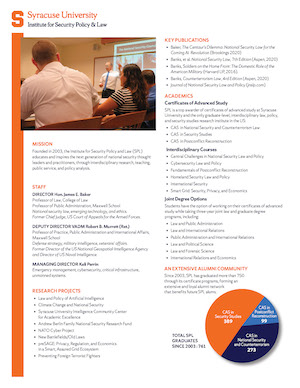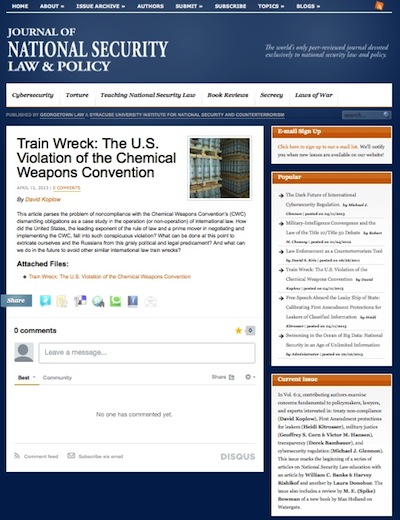There’s just no other place that does it like Syracuse.
—Former US Secretary of Defense Ashton Carter
Syracuse University Institute for Security Policy and Law (SPL) is a multidisciplinary, university-based center for the study of national and international security. The Institute offers certificates of advanced study, conducts incisive research on security topics, and provides timely policy analysis.
Headquartered in the Syracuse University College of Law, SPL is a collaboration among the College of Law, the Maxwell School of Citizenship and Public Affairs, and other SU colleges and departments. SPL’s initiatives and projects have shaped security dialogues on law and policy since 2003.
SPL’s extensive national security capabilities were founded—in 2003, as the Institute for National Security and Counterterrorism—on the expertise of Professor Emeritus William C. Banks. Banks helped set the scholarly parameters of the national security field by co-authoring two leading textbooks—National Security Law (Aspen, 6th ed.) and Counterterrorism Law (Aspen, 3rd ed.)—and by initiating the New Battlefields/Old Laws (NBOL) project examining international humanitarian law (IHL) in the 21st century.
Since 2018, SPL has been led by the Hon. James E. Baker, one of the most highly regarded national security lawyers and policy advisors in the nation. Before joining the College of Law, Baker served on the US Court of Appeals for the Armed Forces for 15 years, the last four as Chief Judge. Continuing his public service, Baker was appointed to the Public Interest Declassification Board by President Barack Obama, and he is a Member of the ABA Rule of Law Initiative Board of Directors.
SPL continues to advance its mission to be an internationally recognized center for interdisciplinary teaching, for multi-method research into complex security problems, and for public service to practitioners grappling with seemingly intractable national, international, and human security issues. Agile and responsive, SPL’s educational and research programs continue to track the changing nature of these issues, as battlefields become virtual, wars become asymmetric, homeland security remains critical, human rights crises become commonplace, and the rule of law becomes indispensable.
SPL’s interdisciplinary law and graduate academic programs give law and policy students the best possible theoretical and practical training as they prepare themselves for careers in national and international security and counterterrorism. SPL’s research portfolio engages these cross-domain topics in six key areas: national security and counterterrorism law and policy; cybersecurity and cyberespionage; Middle East security and Islamic rule of law; security governance and postconflict reconstruction; homeland security; and defense strategy and veterans affairs.
In addition to books, monographs, and white papers, SPL experts organize and contribute to international conferences and workshops (such as New Battlefields/Old Laws; Law and Security: Perspectives from the Field and Beyond; and Controlling Economic Cyber Espionage); host public lectures (such as the Becker Middle East Security and the Everett Postconflict Reconstruction speaker series); and, in collaboration with Georgetown Law, produce the Journal of National Security Law and Policy, the only peer-reviewed journal of its kind.
The Institute has forged several national and international partnerships in its spheres of research, most notably with the American Bar Association Standing Committee on Law and National Security; Institute for Counter-Terrorism (Herzliya, Israel); International Committee of the Red Cross; International Institute of Higher Studies in Criminal Sciences (Siracusa, Italy); King Faisal Center for Research and Islamic Studies (Saudi Arabia); NATO Cooperative Cyber Defence Centre of Excellence (Tallinn, Estonia); Brookings’ Saban Center for Middle East Policy; United States Institute of Peace; US Army Peacekeeping and Stability Operations Institute; and the Warrior-Scholar Project.
Among Syracuse University’s colleges and departments, the Institute collaborates with the College of Engineering and Computer Science; Department of Economics; Department of Public Administration and International Affairs; Institute for Veterans and Military Families; Moynihan Institute of Global Affairs; Newhouse School of Public Communications; Program for the Advancement of Research on Conflict and Collaboration; The School of Information Studies (iSchool); and Whitman School of Management.
Key Capabilities
Public Service & Policy Analysis
SPL projects and initiatives have helped shape the national and global dialog concerning security and terrorism law and policy.
- What is the next security challenge? National security and counterterrorism experts at SPL continue to engage the issues to identify where policy makers and practitioners can best place their resources.
- Thanks to strategic growth and interdisciplinary understanding of the field, SPL remains on the leading edge of national security and counterterrorism research and policy analysis.
- Our interdisciplinary approach leverages expertise in law, foreign policy, military planning, political science, public affairs, peace studies, public management, diplomacy, anthropology, history, law, communications, economics, engineering, cybersecurity and emerging technologies, and more.
- Our scholars and practitioners take into account the changing patterns of global conflict and structural changes in world order to provide the most appropriate legal and policy advice to solve complex challenges.
- Our evolving mission follows the contours of the changing threat landscape—from virtual terrorism, fourth-generation warfare, and asymmetric conflict to homeland security, climate security, critical infrastructure, and cybersecurity.
- SPL studies the balance between robust and soft power responses to security and terrorism threats and strongly emphasize the role of peacekeeping, conflict resolution, and rule-of-law-based postconflict reconstruction.
Interdisciplinary Research
Our interdisciplinary research projects and areas of interest contribute to a comprehensive national and international security and counterterrorism research portfolio.
- Research includes ground-breaking explorations into “New Battlefields, Old Laws,” Middle East Security, and Cybersecurity.
- SPL is a collaboration among these SU colleges and schools: College of Law; Maxwell School of Citizenship and Public Affairs; LC Smith College of Engineering and Computer Science; and the SI Newhouse School of Public Communications.
- Research and program collaborations beyond SU include those with the American Bar Association; Combating Terrorism Center at West Point; Georgetown Law; Interdisciplinary Center in Herzliya, Israel; International Committee of the Red Cross; UN Peacebuilding Support Office; US Army Peacekeeping & Stability Operations Institute; and US Institute for Peace.
- SPL Research and Practice Associates provide additional academic and practical subject matter expertise.
- A joint project of Georgetown Law and SPL, the Journal of National Security Law and Policy is the only peer-reviewed journal of its kind. Its topics include FISA, cybersecurity, laws of war, humanitarian law, shadow wars, and more.
- Among SPL’s many conferences, seminars, and panel discussions are the Carol Becker Middle East Security Speaker Series and the David F. Everett Lecture Series in Postconflict Reconstruction.
Law & Graduate Education
SPL offers a challenging combination of national security and counterterrorism law and security studies, and the Institute’s law and graduate programs are a calibrated mix of academic research and real-world practice.
- Law and graduate students can choose from SPL’s certificates of advanced study in National Security and Counterterrorism Law, Security Studies, and/or Postconflict Reconstruction.
- SPL’s varied academic offerings also include the Program on Security in the Middle East (which provides cross-cultural engagement with scholars, experts, and practitioners through graduate study abroad fellowships, the Carol Becker Speaker Series, and other opportunities) and a range of workshops, seminars, symposia, and guests that deepens the security and counterterrorism conversation.
- Students are considered for capstone projects, graduate and research assistantships, internships, and research fellowships.
- Students can extend their interest in this topic area through the SPL-sponsored Student Association on Terrorism and Security Analysis (which produces an annual conference and the Journal on Terrorism and Security Analysis).
- A rich curriculum across a spectrum of sub-disciplines positions SPL students for public and private sector jobs and careers in national security, homeland security, counterterrorism, cybersecurity, and postconflict reconstruction.
- SPL is led by distinguished subject matter experts—the Hon. James E. Baker, an internationally recognized authority in national security, the intelligence community, and emerging technologies and the law, and VADM Robert B. Murrett (Ret.), former Director of the US National Geospatial Intelligence Agency.
- Other faculty members are drawn from political science, public and international affairs, public management, sociology, anthropology, history, law, communications, economics, and elsewhere.
- Alumni are employed at the American Red Cross; Atlantic Council; Booz Allen Hamilton; Brookings Institution; Deloitte; departments of Defense, Homeland Security, Justice, and State; Foreign Service Institute; Judge Advocate General’s Corps; National Security Agency; US Institute of Peace; World Bank; World Vision; and elsewhere.
- Former students stay in touch via active social media channels and alumni network gatherings.
History
Click on the dates below to read about the Institute’s progress year-by-year:
The Institute for National Security and Counterterrorism (INSCT) at Syracuse University is established in 2003 by SU’s College of Law. The Institute changed its name to the Syracuse University Institute for Security Policy and Law (SPL) in October 2019.
SPL begins its Curricular Program in National Security and Counterterrorism Law, offering students base courses in national and international security and counterterrorism law and policy, as well as interdisciplinary elective courses.
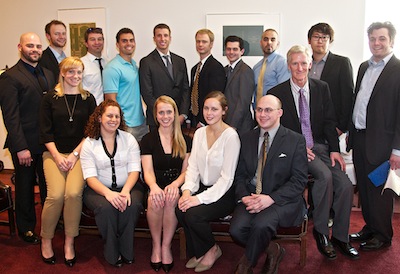 2013 Curricular Program in National Security and Counterterrorism Law Graduates
2013 Curricular Program in National Security and Counterterrorism Law Graduates
The Maxwell School of Citizenship and Public Affairs, with the support of Dean Mitchel B. Wallerstein, joins the SU College of Law in sponsoring the SPL.
Maxwell School Dean Mitchel B. Wallerstein becomes an SPL Senior Policy Advisor, a position he continues to hold as President of Baruch College, City University of New York.
Gen. Montgomery C. Meigs, US Army (Ret.) becomes Louis A. Bantle Chair in Business and Government at the Maxwell School. (In 2009, he was named an SPL Senior Policy Advisor.)
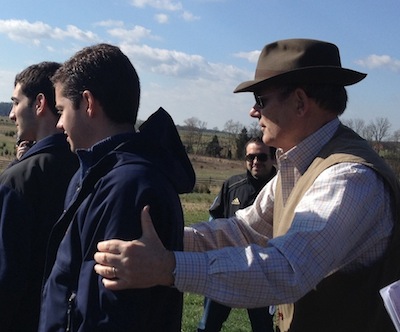 Gen. Montgomery Meigs (Ret.) at the 2013 Defense Strategies “Staff Ride” to Gettysburg
Gen. Montgomery Meigs (Ret.) at the 2013 Defense Strategies “Staff Ride” to Gettysburg
The Maxwell School’s Louis A. Bantle Chair in Business and Government Policy and SPL sponsor the 2005 symposium “The War on Terrorism: Round II,” with keynote speakers Tom Brokaw of NBC News, and Rep. Ellen Tauscher (D-CA) of the House Armed Services and Transportation Committees.
SPL begins to offer its 12-credit Certificate of Advanced Study in Security Studies, designed for graduate students preparing to be professionals in security and counterterrorism.
SPL partners with the Interdisciplinary Center’s Lauder School of Government, Diplomacy, and Strategy and its academic center, the Institute for Counter-Terrorism, in Herzliya, Israel.
Along with SU’s Campbell Public Affairs Institute, SPL hosts the workshop “Citizen, the Soldier, and the State.”
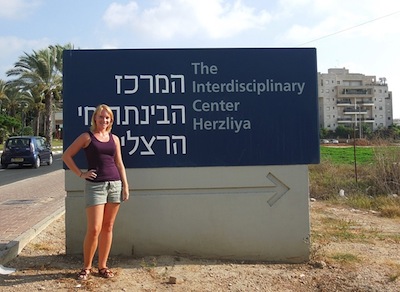 SPL student Emily Schneider (LAW ’13) outside the IDC in Herzliya, Israel
SPL student Emily Schneider (LAW ’13) outside the IDC in Herzliya, Israel
SPL co-sponsors the conference “Challenges in the Struggle Against Violent Extremism: Winning the War of Ideas,” with the Maxwell School’s Louis A. Bantle Chair in Business and Government Policy & National Security Studies program. Keynote speakers include Admiral Edmund P. Giambastiani, vice chairman of the US Joint Chiefs of Staff; Raymond DuBois, former Acting US Under Secretary of Defense; and Dr. Matthew Levitt, Deputy Assistant Secretary for Intelligence and Analysis at the US Department of Treasury.
SPL and the Syracuse Law Review hosts the symposium “A Nuclear Iran: The Legal Implications of a Preemptive National Security Strategy.”
 Admiral Edmund P. Giambastiani, former vice chairman of the US Joint Chiefs of Staff
Admiral Edmund P. Giambastiani, former vice chairman of the US Joint Chiefs of Staff
For the 100th anniversary of The Hague Convention of 1907— and with significant support from Paul Greenberg (SU ’65)—SPL sponsors the symposium “New Battlefields/Old Laws,” launching its continuing project to re-examine policies and laws for the conduct of armed conflict in the age of asymmetric warfare.
Two key texts are published: Counterterrorism Law and Combating Terrorism, both co-authored by William C. Banks.
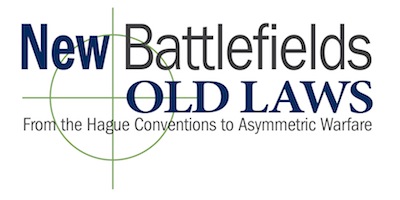
SPL Director William C. Banks is named the first College of Law Board of Advisors Distinguished Professor at Syracuse University.
From September to November, SPL hosts the National Security Advice Speaker Series, beginning with the panel discussion “National Security Advice for the Next Administration” and continuing with talks by Bruce Hoffman and Job Henning.
The “Old Battlefields, New Laws” project continues with the conference “State Conflicts with Non-State Actors,” part of ICT’s 8th Annual International Counter Terrorism Conference in Herzliya, Israel.
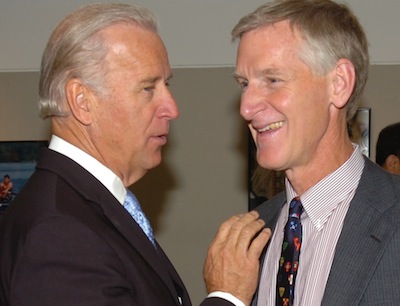 US Vice President Joseph Biden (LAW ’68) and Professor William Banks
US Vice President Joseph Biden (LAW ’68) and Professor William Banks
SPL joins University of the Pacific, McGeorge School of Law as co-sponsor of the nation’s only peer-reviewed journal devoted exclusively to national security law and policy: the Journal of National Security Law & Policy. The journal is now co-produced by SPL and Georgetown Law.
The David F. Everett Postconflict Reconstruction Speaker Series begins, a part of SPL’s Postconflict Reconstruction program. The first speaker is Dr. Veronique Dudouet, researcher at the Berghof Research Center for Constructive Conflict Management in Berlin, Germany.
SPL hosts the Islam and International Humanitarian Law Workshop, a gathering scholars and practitioners with interest in the contribution of Islam to the rules governing the conduct of warfare and humanitarian law.
SPL formalizes its relationship with the Maxwell School’s Downing Scholars program, an academic partnership with the Combating Terrorism Center at the US Military Academy at West Point, NY. Maj. Christopher DeMure and Maj. Don Canterna are SPL’s first Downing Scholars.
SPL begins offering its Certificate of Advanced Study in Postconflict Reconstruction, to provide students with a documented concentration and familiarization with the major aspects of this emerging discipline.
The United States Institute of Peace (USIP), International Institute of Higher Studies in Criminal Sciences (ISISC), and SPL begin the Postconflict Justice and Islam project to assess the conformity to the Shari’a of internationally recognized modalities of postconflict justice for international crimes.
The Maxwell School announces the creation off the Andrew Berlin Family National Security Research Fund, established in honor of Professor David H. Bennett and operated through SPL. The fund provides research and related support to Maxwell School faculty and students affiliated with SPL.
SPL hosts its first US Army Senior Service Fellow. Col. Geoffrey D. Stevens is an experienced practitioner in national security and counterinsurgency matters and author of the SPL report “Whole of Government Approach to Countering Domestic IEDS: Leveraging Military Capabilities.”
In March, James B. Steinberg becomes Dean of the Maxwell School and an SPL Senior Policy Advisor. Prior to joining SU, Steinberg was US Deputy Secretary of State.
Vice Admiral Robert B. Murrett (Ret.), former Director of the National Geospatial Intelligence Agency, joins SPL as Deputy Director.
With support from SU alumna Carol Becker (’76), SPL begins offering Becker Study Abroad Fellowships and the Becker Speaker series, as part of its Security in the Middle East program.
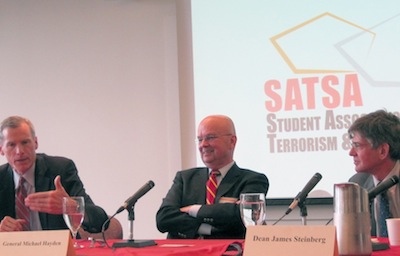 Professor Robert Murret, Gen. Michael Hayden, and Maxwell School Dean James Steinberg at at panel discussion organized by SATSA in 2010
Professor Robert Murret, Gen. Michael Hayden, and Maxwell School Dean James Steinberg at at panel discussion organized by SATSA in 2010
SPL joins with the American Bar Association to host the 3rd Annual Seminar on Teaching Law and National Security at SU, a conference that brings together the practitioner and academic communities to discuss the teaching of national security law and the training of future practitioners.
SPL hosts US Army Senior Service Fellow Col. Casimir Casey, a practitioner of intelligence gathering and analysis and an assistant professor at the US Military Acedmy at West Point, NY.
In February 2013 the Institute for Veterans and Military Families (IVMF) and SPL released “A National Veterans Strategy: The Economic, Social and Security Imperative,” a report that develops a logical and researched case for the social, economic, and security-based interests served by a whole-of-the-nation National Veterans Strategy.
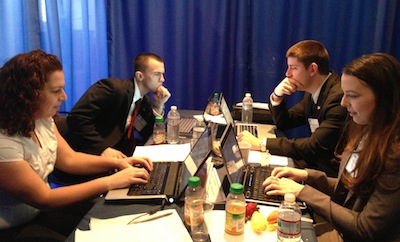 SPL students at the Georgetown Law National Security Crisis Invitational, March 2013
SPL students at the Georgetown Law National Security Crisis Invitational, March 2013
n April 2013, four security studies graduate students from Syracuse University’s College of Law and the Maxwell School of Citizenship and Public Affairs took part in the first National Security Crisis Law Invitational from April 4 to 6, 2013 at Georgetown Law in Washington, DC.
In April 2013, SPL recognized 32 CAS in Security Studies students; 16 CAS in Postconflict Reconstruction (PCR) students; and 19 Curricular Program in National Security and Counterterrorism Law students. This graduation brought the total number of SPL alumni to 470 over 10 years (185 total law program grads; 232 CAS in Security Studies grads; and 53 total CAS in PCR grads).
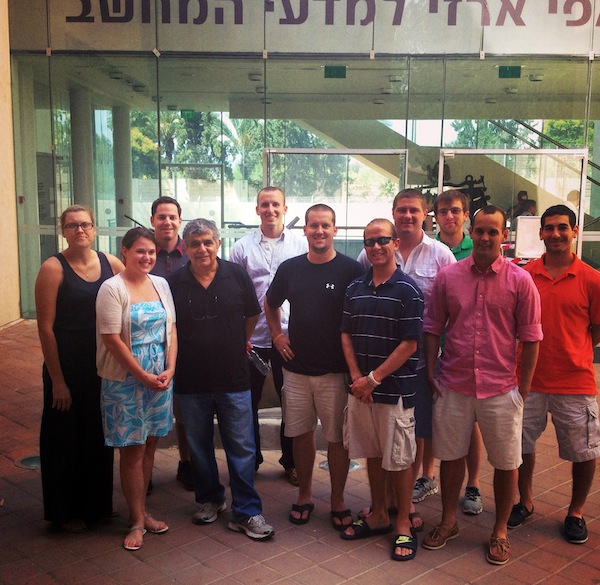 SPL students in Herzliya, Israel, July 2013. (L to R) Abigail Reese, Callie Moncus, Seth Binder, Dr. Eitan Azani, Zach Shannon, Andrew Pappart, Dan Haverty, Geoff Daniels, Alex Wiemer, and Greg Flatow.
SPL students in Herzliya, Israel, July 2013. (L to R) Abigail Reese, Callie Moncus, Seth Binder, Dr. Eitan Azani, Zach Shannon, Andrew Pappart, Dan Haverty, Geoff Daniels, Alex Wiemer, and Greg Flatow.
In Summer 2013, 10 SPL students traveled to Herzliya, Israel as part of the Program on Security in the Middle East.
In July 2013, Lt. Col Craig Baumgartner joined SPL as a 2013-2014 Army War College Fellow.
In September 2013, SPL Director William C. Banks and faculty member Louis Kriesberg published essays with the “Redrafting Perpetual Peace” multinational project, which reexamines and revises Immanuel Kant’s six Preliminary Articles for Perpetual Peace Among States, written in 1795. Banks’ contribution explores Kant’s Preliminary Article VI: “No state at war with another shall adopt such modes of hostility as would necessarily render mutual confidence impossible in a future peace.” Kreisberg’s essay contemplates Preliminary Article III: “Standing Armies shall be entirely abolished in the course of time.”
In September 2013, SPL and the Institute for Counter-Terrorism (ICT) at the Interdisciplinary Center in Herzliya, Israel launched IHLToday.com, part of SPL/ICT’s acclaimed New Battlefield, Old Laws project. The site is intended to provide a digital format to advance the international legal framework that has evolved for modern warfare.
In January 2014, SPL Faculty Member David M. Crane co-authored the “Caesar Report” documenting alleged war crimes by the Syrian government during the Syrian Civil War. Crane testtifed to the UN Security Council about the report’s findings.
In early 2014, SPL was invited to join the Brookings Institution Saban Center US-Islamic World Forum in Doha, Qatar.
In March 2014, SPL began a partnership with Mitvim, the Israeli Institute for Regional Foreign Policies. SPL Becker Fellows began studying at Mitvim in summer 2014.
In April 2014, new Faculty Member Nathan Sales, an expert in national security and administrative law, was welcomed to the SPL team.
In July 2014, COL Mike Buckley and LTC Patricia Hagen joined SPL as a 2014-2015 Army War College Fellows.
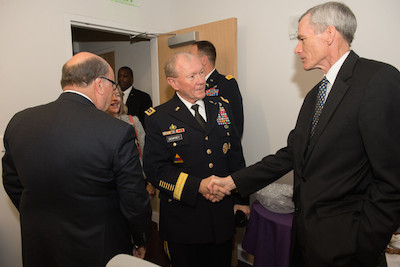
In October 2014, SPL helped celebrate the 90th anniversary of SU’s Maxwell School of Citizenship and Public Affairs by inviting Gen. Martin E. Dempsey, Chairman of the US Joint Chiefs of Staff, to speak at the SU College of Law about “Public Service in an Age of Complex Global Security Challenges.” The talk was co-sponsored by SU’s Institute for Veterans and Military Families.
In December 2014, representatives from SPL traveled to the Arab Gulf to co-host this preparatory workshop toward a future international conference on Islam and the Laws of War, to be held in Riyadh, Saudi Arabia in 2015. “The Role of Shari’a and Islamic Laws of War in Contemporary Conflict” workshop took place at the King Faisal Center for Research and Islamic Studies (KFCRIS) in Riyadh, Saudi Arabia on Dec. 14 and 15, 2014. The workshop was hosted by Prince Turki bin Faisal Al Saud, Chairman of KFCRIS. Co-hosts of the event, along with SPL, were two partners in SPL’s Islam, Law, and War research project: the US Institute of Peace (USIP) and Italy’s International Institute of Higher Studies in Criminal Sciences (ISISC).
In April 2015, US Secretary of Defense Ashton Carter was a guest of the Institute for Veterans and Military Families, where he met to discuss Syracuse University’s veterans programs with, among other, SPL Deputy Director Robert B. Murrett.
In April 2015, the Curricular Program in National Security and Counterterrorism formally becomes the Certificate of Advanced Study in National Security and Counterterrorism.
In June 2015, SPL hosted Controlling Economic Cyber Espionage, co-sponsored NATO Cooperative Cyber Defence Center of Excellence, a two-day workshop that examined the state of domestic and international approaches for controlling this postmodern form of economic, military, and industrial spying.
In June 2015, SPL Director William C. Banks was named Interim Dean of Syracuse Law, replacing Dean Hannah Arterian.
In October 2015, SPL and CCDCOE hosted a workshop in Tallinn, Estonia, on “Human Rights in Cyberspace.”
In November 2015, SPL Director of Research Corri Zoli—whose research examines the perception of military veterans toward post-service education and employment—was invited by Warrior-Scholar Project (WSP) to chair its Academic Board of Directors. WSP helps veterans succeed in higher education with immersive one- to two-week long academic boot camps hosted at universities (including SU) during summer break. Other members of WSP’s academic board are retired Gen. David H. Petraeus and Ambassador Paul Russo.
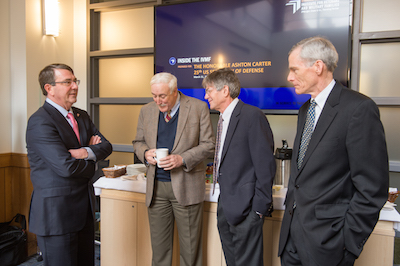
In January 2016, SPL Director William C. Banks published, along with Professor Stephen Dycus of Vermont Law School, Soldiers on the Home Front: The Domestic Role of the American Military (Harvard UP).
In April 2016, SPL recognized 54 successful candidates in the National Security and Counterterrorism Law, Security Studies, and Postconflict Reconstruction certificates of advanced study programs.
In June 2016, SPL Deputy Director Robert B. Murrett won the prestigious Birkhead-Burkhead Teaching Award from the SU Maxwell School.
In August 2016, Lt. Col. Michael S. McFadden joined SPL as an Army War College Fellow.
In December 2016, the UN General Assembly created the “Syrian Accountability Center,” assisted in this effort by SPL Faculty Member David M. Crane.
In April 2017, SPL became a sponsor of the ABA Standing Committee on Law and National Security’s Annual Review of the Field conference.
In April 2017, SPL recognized 33 successful candidates in the National Security and Counterterrorism Law, Security Studies, and Postconflict Reconstruction certificates of advanced study programs.
In May 2017, the Syracuse Law Class of 2017 bestowed on SPL Director William C. Banks the Res Ipsa Loquitor Award at their Commencement. The award is given to a faculty member whose service, scholarship, and stewardship “speaks for itself.”
In June 2017, President Donald J. Trump nominated SPL Faculty Member Nathan A. Sales to the position of Coordinator for Counterterrorism with the Rank and Status of Ambassador-at-Large at the US Department of State’s Bureau of Counterterrorism and Countering Violent Extremism. Sales was confirmed by the US Senate on Aug. 3, 2017.
In September 2017, SPL convened the 10th annual New Battlefields/Old Laws workshop in Herzilya, Israel. A signature SPL project, NBOL has been at the forefront of inquiry into updating centuries-old laws and norms of armed conflict in the age of asymmetric warfare.
In November 2017, the annual SPL Alumni Reunion included the honoring of Director William C. Banks for 15 years at the helm of the Institute.
In December 2017, SPL Director William C. Banks was named Senior Fellow at Georgetown Law’s Center on National Security and the Law.

In March 2018, David M. Crane announced his retirement from the Syracuse University College of Law, after 12 years as a Professor of Practice. He was named a Syracuse University College of Law Distinguished Scholar in Residence.
In March 2018, SPL students once again took part in the National Security Crisis Law Simulation at Georgetown Law. This year, the students competed not only with other national security law students from the US but also students from six Canadian universities, the Australian National University, and the UK.
In July 2018, noted jurist, scholar, and law and policy practitioner the Hon. James E. Baker joined the faculty of Syracuse University College of Law, as well as the Maxwell School of Citizenship and Public Affairs, as a Professor in Fall 2018 and took the helm of SPL from Professor William C. Banks, who founded the Institute in 2003.
In April 2019, SPL surpassed 700 certificates awarded to Syracuse University law and policy students since 2003.
In April 2019, the Institute welcomed five National Security experts as Distinguished Fellows. These Fellows—drawn from the upper echelons of the national security and intelligence communities—will assist the Institute’s mission with a variety of assignments that will directly benefit students and expand SPL’s portfolio of research and policy projects.
In June 2019, the US Intelligence Community designated Syracuse University as one of eight national Intelligence Community Centers for Academic Excellence (ICCAE), with a funding award of $1.5 million over five years. Established in 2005 by Congress, the ICCAE program is designed to increase the number of culturally and ethnically diverse, multi-disciplinary professionals in the intelligence community. “At its heart this effort aims to build a diverse workforce for the intelligence community that represents the full spectrum of our country’s population—reflected ethnically and culturally, and by gender, through sustainable national security education programs that will complement students’ primary areas of study,” says Vice Admiral Robert Murrett (Ret.), Principal Investigator, Maxwell School Professor of Practice, and Deputy Director of SPL.
In October 2019, SPL Director the Hon. James E. Baker was named a National Academy of Public Administration Fellow. NAPA is a congressionally chartered academy providing expert advice to government leaders. Induction is considered one of the leading honors for public administration scholars.
The inaugural Carol Becker Lecture was held at Syracuse University’s Lubin House in New York City in October 2019. In front of a packed audience, award-winning journalist George Packer and Judge Baker discussed “American Leadership in the 21st Century.” Dean Boise, University Trustee Christine Larsen G’84, and Carol Becker ’76 were among the special guests.
In November 2019, the Institute for National Security and Counterterrorism officially changed its name to the Syracuse University Institute for Security Policy and Law, to more fully reflect the full spectrum of national and international security challenges the Institute addresses.
In November 2019, SPL announced a $500,000 research partnership with the Center for Security and Emerging Technology to assist CSET in investigating the legal, policy, and security impacts of emerging technology.
In March 2020, the SU Intelligence Community Centers for Academic Excellence held a day-long symposium in the University’s Hall of Languages. The first panel of the day—“Teaching Intelligence: Policy, Law, and Ethics”—featured Judge Baker, Professor Robert B. Murrett, and Professor Laurie Hobart.
Judge Baker published The Centaur’s Dilemma: National Security Law for the Coming AI Revolution (Brookings) in December 2020. In the book, Judge Baker addresses how national security law should be applied to the emerging field of artificial intelligence.

